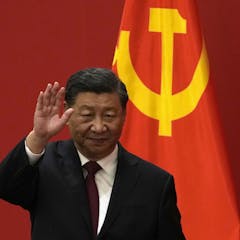
Articles on Chinese politics
Displaying all articles

Journalist Yuan Yang tells the stories of four women who grew up in China as the nation transformed from a socialist to a market economy. Her book is a breath of fresh air.

Young people are angry at COVID restrictions, but also poor job prospects and China’s heavy-handed suppression of free speech.

The Chinese leader’s recent confirmation of his power has significant implications – and a look at history can reveal what those are.

Xi is now the most powerful Chinese leader since Mao Zedong.

Chinese President Xi Jinping has effectively become “leader for life” at this weekend’s congress. But his strict COVID zero policy may bring economic turmoil.

The similarities between ongoing settler-colonialism in China and the history of settler-colonialism in Canada are frighteningly similar.

New school textbooks in China focus less on the Chinese Communist Party and more on its figurehead Xi Jinping. The growing cultivation of a personality cult is reminiscent of the days of Mao Zedong.

Confucius looked nothing like the great sage in his own time as he is widely known in ours. But his ideas continue to shape contemporary life for many.

Increasingly strained relations between the two countries are adding to the challenges of teaching students enrolled in Chinese studies at Australian universities.

When China’s Premier Li Keqiang delivered the annual government work report on the opening day of the National People’s Congress, COVID-19 was at the heart of it.

The Chinese Communist Party has long used healthcare as part of its propaganda operation.

There’s a very unflattering historical parallel for Xi Jinping’s move to lift term limits. The Chinese Communist Party is having none of it.

Xi Jinping is now ruling without term limits. That’s bad news for corrupt officials – and perhaps for the Chinese people.

Brexit means the UK is seeking new partners, but how much is it willing to put up with to get a deal?

Still smarting from centuries of ancient humiliation, China is ready to rise to global supremacy.

China’s Xi Jinping has a crucial political manoeuvre to execute at home – and North Korea has stolen the limelight.

The future direction of the Chinese Communist Party will be decided at this year’s National Congress. The leader may not change but there are key roles up for grabs.

It’s more important than ever that the U.S. understand China. So why don’t our universities teach Chinese thought?

The lessons of Liu’s life and work must never be forgotten.
